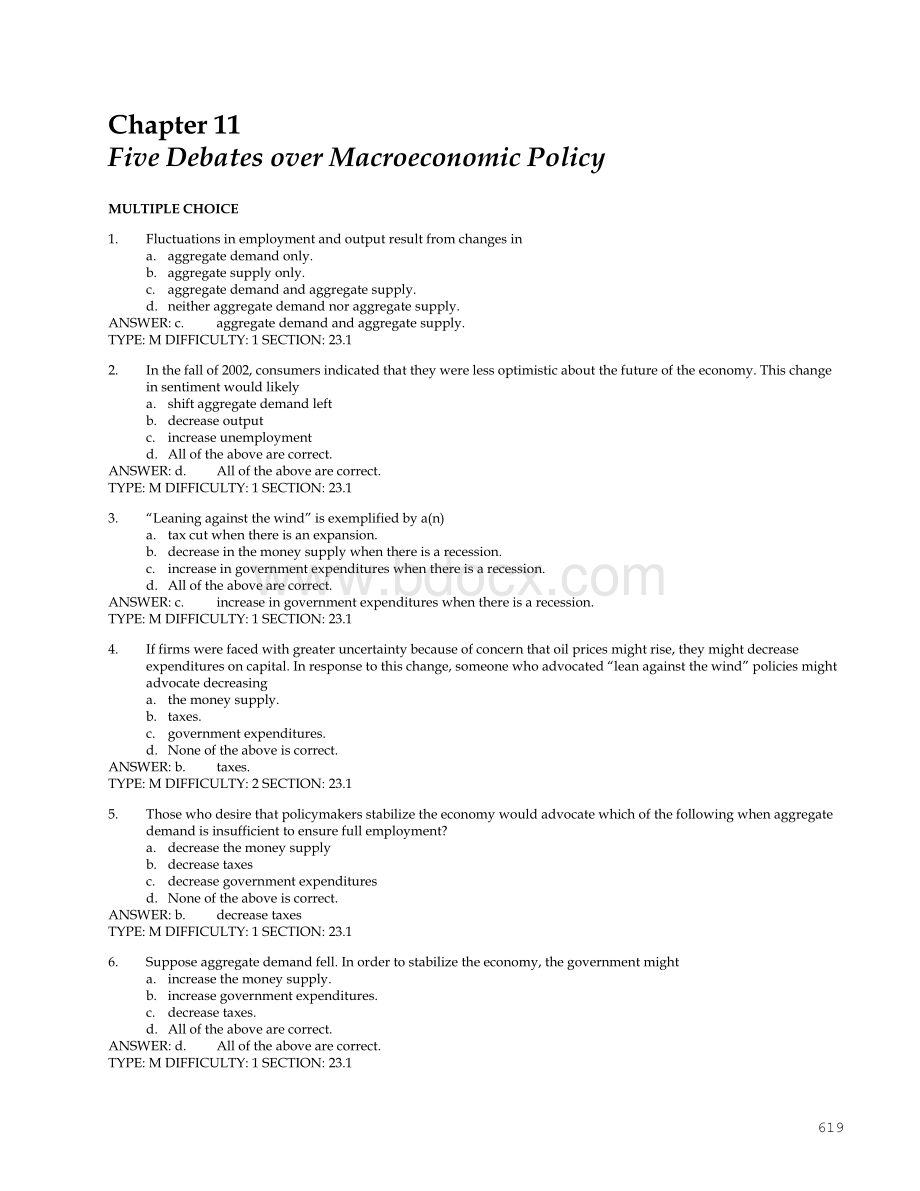11宏观经济学(曼昆-第6版-配套习题Word格式文档下载.doc
《11宏观经济学(曼昆-第6版-配套习题Word格式文档下载.doc》由会员分享,可在线阅读,更多相关《11宏观经济学(曼昆-第6版-配套习题Word格式文档下载.doc(15页珍藏版)》请在冰豆网上搜索。

c. aggregatedemandandaggregatesupply.
d. neitheraggregatedemandnoraggregatesupply.
ANSWER:
c. aggregatedemandandaggregatesupply.
TYPE:
MDIFFICULTY:
1SECTION:
23.1
2. Inthefallof2002,consumersindicatedthattheywerelessoptimisticaboutthefutureoftheeconomy.Thischangeinsentimentwouldlikely
a. shiftaggregatedemandleft
b. decreaseoutput
c. increaseunemployment
d. Alloftheabovearecorrect.
d. Alloftheabovearecorrect.
3. “Leaningagainstthewind”isexemplifiedbya(n)
a. taxcutwhenthereisanexpansion.
b. decreaseinthemoneysupplywhenthereisarecession.
c. increaseingovernmentexpenditureswhenthereisarecession.
c. increaseingovernmentexpenditureswhenthereisarecession.
4. Iffirmswerefacedwithgreateruncertaintybecauseofconcernthatoilpricesmightrise,theymightdecreaseexpendituresoncapital.Inresponsetothischange,someonewhoadvocated“leanagainstthewind”policiesmightadvocatedecreasing
a. themoneysupply.
b. taxes.
c. governmentexpenditures.
d. Noneoftheaboveiscorrect.
b. taxes.
2SECTION:
5. Thosewhodesirethatpolicymakersstabilizetheeconomywouldadvocatewhichofthefollowingwhenaggregatedemandisinsufficienttoensurefullemployment?
a. decreasethemoneysupply
b. decreasetaxes
c. decreasegovernmentexpenditures
b. decreasetaxes
6. Supposeaggregatedemandfell.Inordertostabilizetheeconomy,thegovernmentmight
a. increasethemoneysupply.
b. increasegovernmentexpenditures.
c. decreasetaxes.
7. Whichofthefollowingarebothpoliciesthatareconsistentwithtryingtostabilizeoutputwhenpricesandoutputrise?
a. decreasethemoneysupplyanddecreasetaxes
b. increasethemoneysupplyanddecreasetaxes
c. decreasethemoneysupplyanddecreasegovernmentexpenditures
d. increasethemoneysupplyanddecreasegovernmentexpenditures
c. decreasethemoneysupplyanddecreasegovernmentexpenditures
8. Ingeneral,thelongestlagfor
a. bothfiscalandmonetarypolicyisthetimeittakestochangepolicy.
b. bothfiscalandmonetarypolicyisthetimeittakesforpolicytoaffectaggregatedemand.
c. monetarypolicyisthetimeittakestochangepolicy,whileforfiscalpolicythelongestlagisthetimeittakesforpolicytoaffectaggregatedemand.
d. fiscalpolicyisthetimeittakestochangepolicy,whileformonetarypolicythelongestlagisthetimeittakesforpolicytoaffectaggregatedemand.
d. fiscalpolicyisthetimeittakestochangepolicy,whileformonetarypolicythelongestlagisthetimeittakesforpolicytoaffectaggregatedemand.
9. Theprincipalreasonthatmonetarypolicyhaslagsisthatittakesalongtimefor
a. changesintheinterestratetochangeaggregatedemand.
b. changesinthemoneysupplytochangeinterestrates.
c. theFedtomakechangesinpolicy.
a. changesintheinterestratetochangeaggregatedemand.
10. Opponentsofusingpolicytostabilizetheeconomygenerallybelievethat
a. neitherfiscalnormonetarypolicyhavemuchimpactonaggregatedemand.
b. attemptstostabilizetheeconomycanincreasethemagnitudeofeconomicfluctuations.
c. unemploymentandinflationarenotcauseformuchconcern.
b. attemptstostabilizetheeconomycanincreasethemagnitudeofeconomicfluctuations.
11. Theeffectsofadeclineinthevalueoffinancialassets,suchasstocks,onconsumptionandtheeconomymightbeoffsetby
a. increasingthegovernmentspending.
b. decreasingthemoneysupply.
c. increasingtaxes.
a. increasingthegovernmentspending.
12. Theeconomygoesintorecession.Whichofthefollowinglistscontainsthingspolicymakerscoulddototrytoendtherecession?
a. increasethemoneysupply,increasetaxes,increasegovernmentspending
b. increasethemoneysupply,increasetaxes,decreasegovernmentspending
c. increasethemoneysupply,decreasetaxes,increasegovernmentspending
d. dec